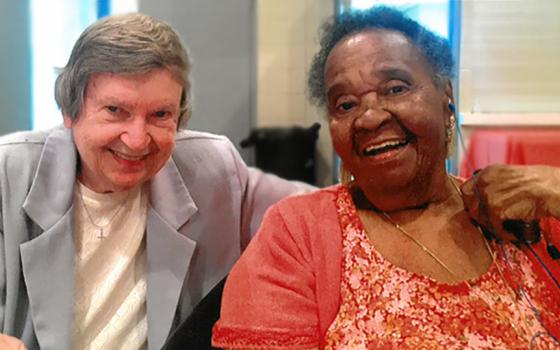I remember the designation of women saints described as "Virgin and Martyr."
Sometimes, I feel like my descriptor might be "Faithful but Furious!"
As I reflect on identifying myself as Catholic, the words often catch in my throat. I struggle with a gut response to clerical sexual abuse while at the same time reading of the refusal of that same clerical church to invite women to enter a legitimate discernment if they feel called to ordination.
How to live with this tension? Leave the church? That's an option many fine Catholic women and men have chosen.
I'm choosing to remain Catholic and recall Christ's words to Barbara Marx Hubbard: "Don't abandon my church. Evolve it." And what would it look like to "evolve" the church rather than abandon her?
It means building on a love for all that has formed me to be a better human being: sacramental awareness much like a Laudato Si' praise for all of life; a social justice conscience that challenged me to grow beyond a Catholic ghetto and embrace the spirit and life of the Second Vatican Council in partnership with others of goodwill; a woman of the word whose awareness of the "living Word" of Scripture is shown repeatedly in the lives of those I accompanied in spiritual direction and retreats; my own deep well of gratitude for courage and confidence that only the Spirit could bring.
It means building on my own deep well of gratitude for women and men of deep faith whose lives gave me insight to continue when I had lost hope, for members of our clerical church who have been a beacon of hope even in the midst of the abuse crises, and so much more.
I cherish the rich gift religious life has been to me and so many others, a gift kept alive in this sometimes crazy and broken institution we call "church."
However, today, as I wonder about my membership in a church I have served for 60 years as a Catholic sister, I'm feeling a desperate sadness. Maybe it's because I empathize with those who like Jamie Manson represent a younger Catholic fidelity and continue to face hierarchical silence. I have read her reflections on attempting dialogue with the hierarchical church, especially asking for the ordination of women within Catholicism. And the answer is still "no dialogue."
We know too readily the loss of parishes because "there is a shortage of priests." I have watched vibrant communities of faith close because of this, without even considering the role of the laity, female and male, in building community.
It is out of this context that I remember some history that other readers will have experienced.
I remember in the 1970s after Vatican II, when several religious congregations sent some of their members to earn Masters of Divinity, hopefully with the intent of "testing the Spirit" to discern a call to ordination.
One of our sisters participated and told me a part of her coursework was to "celebrate a dry Mass" in order to educate them in good liturgical practice. She told me that after she and the other students completed this class assignment, her priest professor wept. With tears in his eyes, he expressed his sorrow at what the people of God were missing because women were denied the testing of their call to ordained ministry, namely, a discernment process.
In the early '80s, I remember that some religious congregations, with the encouragement of the Leadership Conference of Women Religious, sent a list of sisters who had recently received divinity degrees to local bishops, offering their service. And the response was similar to that of today, silence.
How many sisters/laywomen I have met who have served Catholic parishes for five to 15 years or more as pastoral administrators, with parish councils repeatedly inviting them to remain in this position, while bishops terminated their services with little or no reason, in favor of a male priest! I sometimes wonder if the real fear is that some women in ministry do a better job than their male counterparts.
How many male candidates for ordination have had such a lengthy, "on-the-job" discernment before they were called to ordination?
One of our sisters, Grace Marie Mueller, recently retired after many years serving in parishes, including 10 years as parish life coordinator, doing all that a priest-pastor might do except celebrate the sacraments. Her compassion for separated and divorced Catholics, and her gift for speaking with a prophetic voice led the University of Notre Dame to give her the Fr. Jim Young award in 1987 for her service. She was recognized for honoring the giftedness of the lay leadership with whom she shared responsibility for a vibrant parish.
I see it today in women/sisters serving as hospice chaplains, celebrating wakes and funerals across denominational lines, and welcoming the opportunity to support grieving loved ones. Yet the Catholic hierarchy has forbidden them to bless with holy oils those Catholics who are dying, often not finding a priest who has the time or energy or sensitivity to get to know the dying person or their families.
In my attempts to transform my fury into fidelity, I have listened to others who move ahead with/without approbation of the church and serve the needs as they present themselves in the poor, destitute and neglected members of the body of Christ. I meet Christ in his word and look to him for life.
At one point in my desperation, I spent several months reading through Scripture and finding examples of Jesus' mentoring women, healing them, commissioning them, rebuking them, loving them, praising them. I found more than 60 "Mysteries of Encouragement," as I called them.
Along with Scripture, I used commentaries by Elisabeth Schüssler Fiorenza, Joan Chittister, Sandra Schnieders, Elizabeth Johnson and others whose scholarship continues to encourage me even as I write this.
I discovered that even though Jesus may have found some women annoying, he listened and responded with dialogue and compassion. "And Mary said to him, 'They have no wine.' Jesus said, 'Woman, why turn to me? My hour has not yet come.' " Do we hear annoyance in his voice? Regardless, the conversation ends with such an abundance of wine that it brought joy and amazement to all. And this was included in Scripture to let us know that "annoying" women have a place in the story of salvation (John 2:1-10).
I have been called into relationship with Christ through his word and wonder if some churchmen read the same Scripture I do.
Each time I hear of new clerical abuse scandals, I wonder how this might have been corrected earlier had women been in positions of decision-making within the church. This only adds to my "fury": I conclude this reflection hoping to be faithful until the end.
[Judith Best is a School Sister of Notre Dame and coordinator of SturdyRoots.org. She gives presentations on the heritage of the School Sisters of Notre Dame and is also exploring evolution as the bridge between science and religion.]


